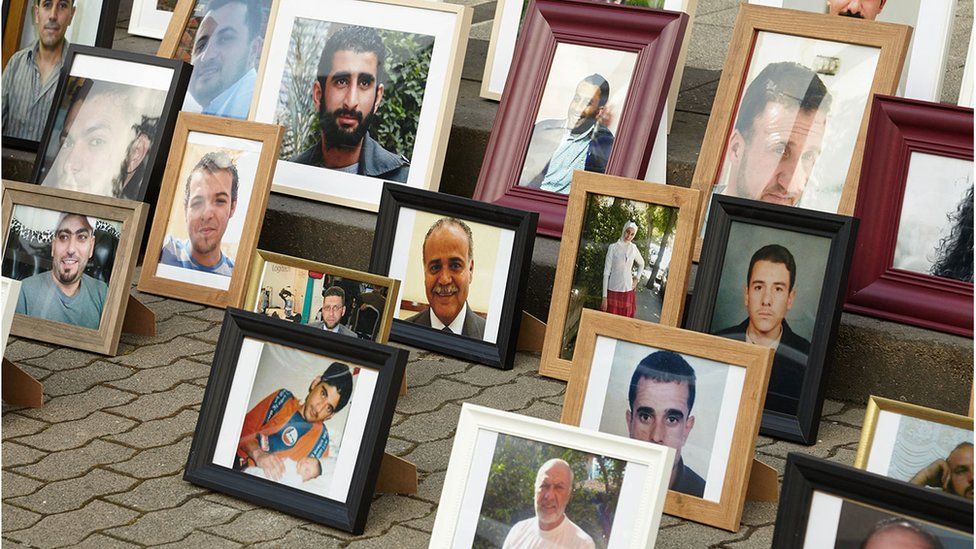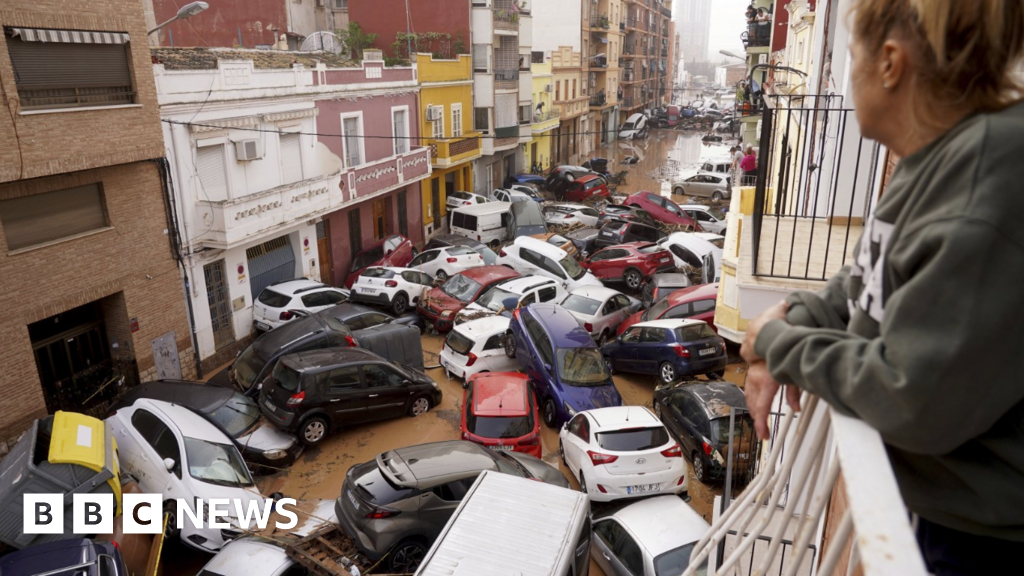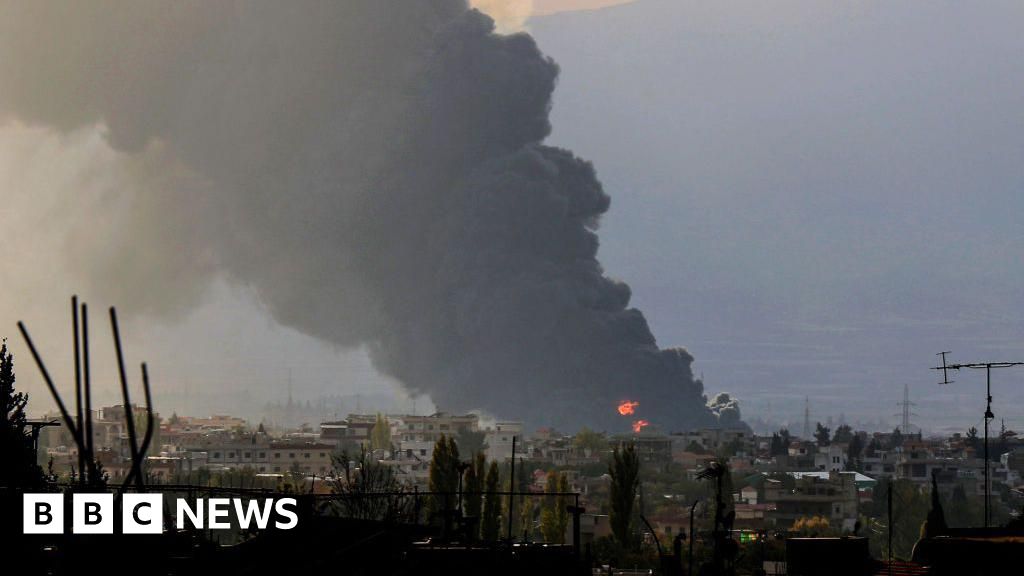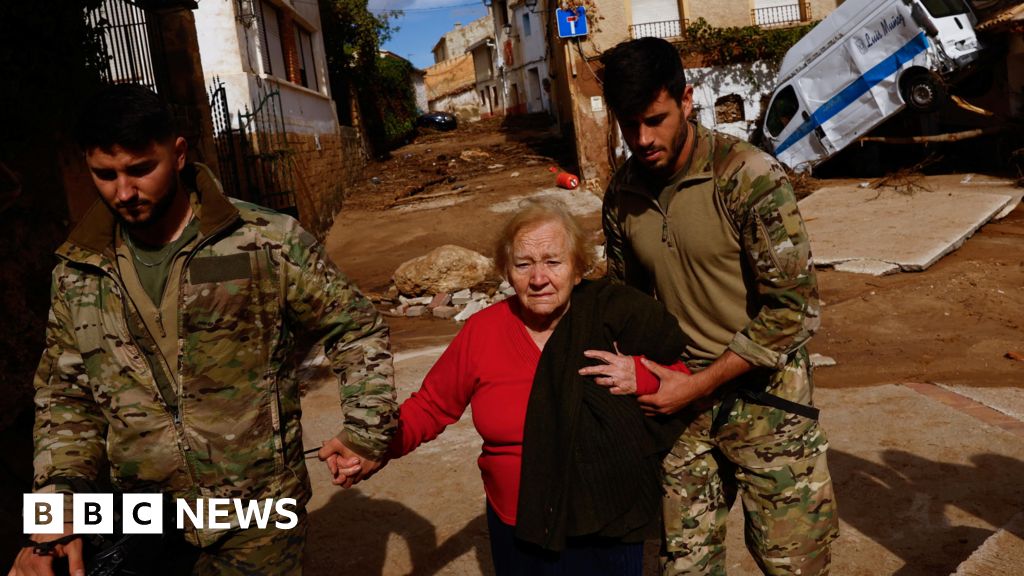ARTICLE AD BOX
 Image source, Adam Broomberg/The Syria Campaign
Image source, Adam Broomberg/The Syria Campaign
Photos of missing Syrians on show at a campaign event in Berlin
By Lina Sinjab
Middle East correspondent
Thousands of people have "vanished" inside Syria's prison system over more than a decade of civil conflict. Their families are left in a desperate situation, forced to pay out large sums of money to middlemen, government and security officials for any information about their loved ones - often with no result.
Off a main street on a hill in northern Istanbul, Malak, a Syrian woman, is remembering the arrest in 2012 of two of her teenage sons.
Her eldest, Mohammad, was 19 and serving in the Syrian army, but he had been ordered to shoot at protesters in his own neighbourhood. He went on the run, but security forces raided the farm where he was hiding, and arrested him.
Soon after this, her second son Maher was also detained: "He was 15 and they took him from the school simply because his brother had defected."
Malak has not seen either Mohammad or Maher since then, but she has tried again and again to find them. The only way she has managed to get any information at all has been by paying large sums of money.
Malak (sitting) has not seen or heard of two of her sons since 2014
In most cases these payments were made to middlemen either working for, or with connection to, members of the Syrian authorities.
For years, Malak dealt with a lawyer who promised her information about her sons, mainly Maher. At every meeting, he asked for some money to pay off middlemen or prison officers.
Over the years, Malak paid more than $20,000 (£16,000) to the lawyer. Nothing ever came of it. She feels now that she was led on by people who were lying to her.
"It's like a drowning man grasping at straws," she says. "They exploit the feelings of a mother looking for her child."
In 2017, after being herself detained for several months, Malak left Syria with her youngest son Ramez and started a new life in Turkey.
Everywhere in her tiny ground-floor apartment, there are photos of her two missing sons.
Malak is now in her mid-50s, with ginger hair and a big smile on her face with shiny eyes. But behind that look, there is deep pain.
Her story is far from unique. Many Syrians are losing huge amounts of money in the search for missing loved ones.
Missing In Syria
Image source, Adam Broomberg/The Syria Campaign
Lina Sinjab's report, Missing in Syria, can be heard on 14 September on Assignment on BBC World Service at 02:32 and 09:32, or Crossing Continents on BBC Radio 4 at 11:00 (all times BST) - it will also be available afterwards on BBC Sounds
There's an assumption that paying bribes is the only way to get anything done, even to find out information about people who've disappeared or even to get them released.
The problem is not that it never works, but that occasionally it can.
Back from the dead
The origins of the civil war in Syria go back to the peaceful uprising of 2011 when many people took to the street to call for change. But President Assad's brutal regime cracked down on unarmed protesters, killing and detaining thousands.
Mohammad Abdulsalam was one of those protesters. He was detained at a checkpoint in the town of Idlib in early 2012. The officer told him he was only going to be questioned for five minutes.
He was imprisoned in the notorious Seydnaya prison, 30km (19 miles) north of the Syrian capital, Damascus.
"I was tortured in the most cruel and brutal way," he says.
Mohammad was held prisoner for five years before a payment secured his release
At one point, his captors thought he had died from his injuries, and took him to the "salt room", where dead bodies were kept (they were covered in salt to stop them smelling). "When I woke up," he says, "I looked right and left and started touching the dead bodies."
When security officers in Seydnaya prison discovered that Mohammad was still alive, they got him out of the salt room back to his cell.
Mohammad's family were given a death certificate in 2014, stating that he had died from a heart attack. However, his father refused to believe this, and continued his search. Through different middlemen, he reached a family connected to President Assad and a deal was made.
He says that his father had to raise more than $40,000 (£32,000) to secure his release. It meant he had to sell the family's land, but Mohammad was freed in 2017. The "five minutes" had lasted for five years. He's now living in Istanbul with his family.
Tragically, Mohammad's father died in an airstrike before he could see his son finally released.
Seydnaya Prison
The UN General Assembly recently adopted a resolution to establish an independent institution on missing persons in Syria to find out about their fate.
Meanwhile, organisations have sprung up to work with relatives of the disappeared, such as the Association of Detainees and Missing in Seydnaya Prison (ADMSP).
Its co-founder is Riyad Avlar - a short, thin man with a beard and a ready smile, he is Turkish, but spent many years in the notorious jail.
Riyad Avlar is a former prisoner, who now helps Syrian families look for their missing relatives
He was arrested in 1996, aged 19, while studying in Syria. His crime was to have criticised the government in a letter to a friend. Like so many, Riyad vanished within the system, and his family heard nothing from him for 15 years.
He was finally released six years ago, after 21 years in prison. He and a fellow prisoner set up ADMSP to help families whose relatives had been imprisoned in Seydnaya.
They began to interview ex-detainees. "We asked them, 'Who was with you?'" says Riyad. He told the former prisoners not to repeat what they heard from other people, but just say who they themselves saw in jail.
Riyad and his friend then collected this information into a database and cross-referenced it with lists of missing Syrians given to them by relatives.
"We began to compare the names… and we began to give the news to the families about their sons and what happened to them."
Image source, US Defense Department
Image caption,A US aerial shot of Syria's notorious Seydnaya prison
Riyad is extremely concerned about the amount of money families who come to him have paid to try to get information. He says he knows some who have had to sell their homes.
The ADMSP has conducted a detailed study of how much has been paid out by families in US dollars, calculating the average-sized payment and multiplying it by the UN figure of 100,000 missing people. They estimate that between 2011 and 2020, the amount paid was $900m (£720m).
Riyad and his team hold workshops to help families spot when they're being duped by middlemen. He shows me a document that was given to relatives and explains why it is an obvious fake. "It has a logo," he says. "There is no intelligence branch in Syria with a logo."
Other forms of deception are less easy to spot.
Riyad put us in touch with Kadri Ahmad Badle. He is currently living in Idlib and trying to find his missing brother who was arrested in 2013.
Kadri and his family have made several attempts - and spent much money - trying to find his brother
Kadri says that only a few weeks ago, someone posted on Facebook that he had just been released from Seydnaya, and could help identify prisoners.
"We got in touch with him and he gave us details about my brother that nobody knew, even describing his tattoo," says Kadri.
The ex-prisoner put him in touch with a lawyer, who promised to secure the release of Kadri's brother for $1,100 (£880).
The family made a down payment of $700 (£560), but after that, both the lawyer and the ex-prisoner disappeared and blocked their phones.
Ten days later, they received an official death certificate stating that Kadri's brother had died in 2014 in Seydnaya.
The middlemen
Riyad says that most of the middlemen offering help are working for the security and intelligence services or alongside them.
This is borne out by a Syrian lawyer we spoke to, who has recently fled to Lebanon.
The lawyer - who prefers to remain anonymous - spent 10 years dealing with cases at the "terrorism court", which mainly deals with civilian detainees arbitrarily arrested by Syrian security forces. The court was created by presidential order in 2012 and its officials are appointed by the security forces.
"[The court] can prosecute someone even for 'liking' something on social media," he says.
Many the defendants at this court will be sent to Seydnaya, if they are not already detained there.
The lawyer adds that the court has been dubbed "the court of the millions" because of the amount of money which changes hands there.
"Corruption and bribery [are] embodied in the backbone of the Syrian regime, so any part of this regime can be bribed," he says.
The lawyer believes that the money is shared out among members of the Syrian authorities: "Sometimes there are higher officers who want a share of the pay."
The lawyer has spent the past decade helping families of the missing and disappeared, and says he has managed to trace and release many from prison.
However, there are still others he has helped, like Sana (not her real name), for whom the trail has run cold.
On a hot summer day in 2012, more than 20 security officers raided her Damascus house and took her son, her husband and her brother.
Sana was approached by many who offered information for money. On one occasion, her family paid a sum of $20,000. They got nothing.
'Sana' says she has little hope that she will ever see her missing family members again
With the help of the lawyer, she checks the military police's death records every month to see if her family members are listed.
In the meantime, all she has left are the photos of her family. Every morning she makes coffee and sits at the coffee table, waiting for the moment they knock on the door and come back.
"I'm living here with my memories," she says. "Their photos are here. I talk to them, I say good morning to them, even if someone else thinks I'm crazy. Maybe believing in it will give me this extra bit of hope for me to be able to continue."
We contacted the Syrian government to comment on this report, but received no reply.

 1 year ago
15
1 year ago
15








 English (US)
English (US)